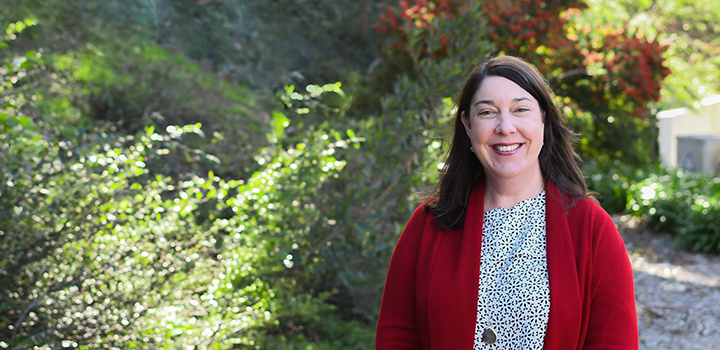Q&A With Assistant Professor Karen Cannon

Karen Cannon, assistant professor and new director of the Brock Center for Agricultural Communication at Cal Poly, is a communication specialist in complex agricultural issues, including messaging and public relations efforts, and is exploring how to use new media and public events to bring people together to engage in discussion about significant food and agricultural challenges.
Q: What do you see as the top skills agricultural communication students are expected to have when they graduate?
A: Fundamentally, agricultural communication students need to be able to write well. This has been true since the early days of agricultural journalism when the field was about communicating new ideas about growing food to farmers. Today, the discipline has expanded and prepares students to communicate to public audiences who have little in the way of firsthand experience with agriculture, making the ability to write about complex ideas in a clear and concise manner essential. They have to be able to interact with people, listen deeply, and formulate great questions to help stimulate discussion and shape the story. Today’s student must also be digitally literate — using the exciting tools being developed to effectively communicate about the research and science behind how food is produced, how animal and plant diseases that have the potential to devastate food production are being addressed, and how other wicked agricultural prob-lems are being addressed and communicate them in a way that target audiences can understand.
Q: How do you see students bridging the gap between consumers and growers/producers?
A: Students have a unique opportunity to help growers and producers figure out how to tell the stories of food production in new and exciting ways, ways that resonate with consumer audiences because of the focus on digital. Because digital is everywhere and travels so fast, so too do messages about agriculture. Understanding how and when to use certain communication technologies is a tremendously valuable role that agricultural communication students can fill to be part of the bridge-building process between consumers and producers.
Q: As natural resources continue to dwindle and the world’s population grows, will the role of agricultural communicators become increasingly important?
A: Cal Poly’s agricultural communication students’ ability to take in, process and communicate complex science and research material will increase in demand in the coming years as the science of food production becomes ever more complex. As scientists and researchers discover more, our need for professionals to help translate those results in ways that illustrate meaning will continue to increase, making the role of agricultural communicators ever more important. The fast pace of today’s digitally focused life means that people expect things to happen more quickly than ever. Students are trained to be able to learn new ideas, technologies and concepts quickly and turn around and apply them to projects they’re working on almost immediately. These Learn by Doing opportunities prepare them to hit the ground running when they enter careers in communication.
Visit the Cultivate Spring 2019 Page to read more stories.